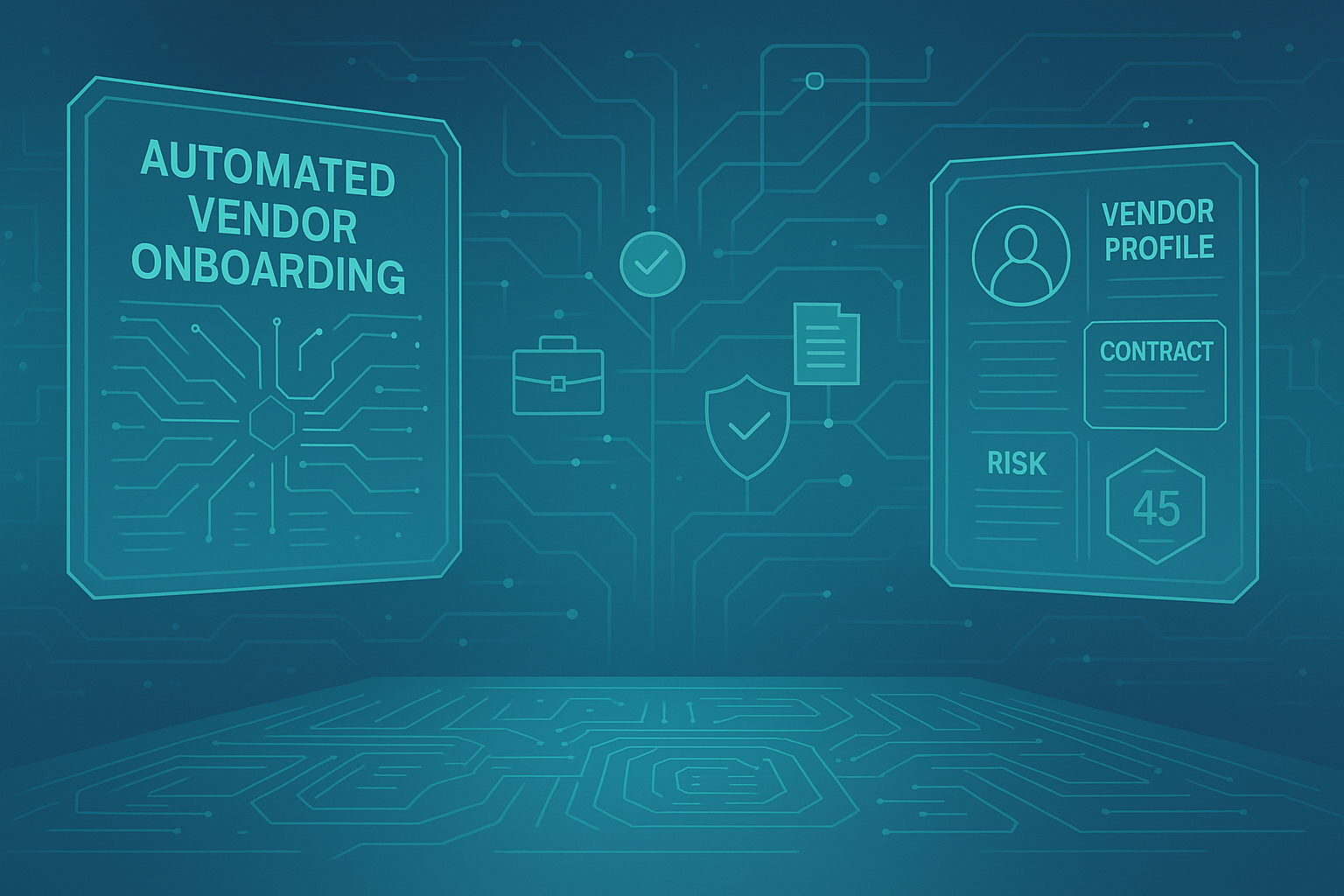

As CFO, you need to protect profit while cutting complexity. You own financial strategy, profitable growth, risk posture, and capital efficiency. You need to ensure every pound spent drives margin, auditability, and compliance under rising regulatory scrutiny.
A manual, spreadsheet-driven vendor-onboarding process - complete with inconsistent approvals and siloed contract data - often obscures vendor duplication, hides spend leakage and magnifies compliance risk.
This article shows how finance leaders can reclaim control of vendor onboarding and transform a slow, fragmented workflow into a modern engine of efficiency, governance, and strategic insight.
When vendor onboarding spans Finance, Procurement and Legal, without a single point of control, hidden costs and risks multiply. A CFO-led approach. that closes those gaps and safeguards profitability, auditability, and reputation needs to:
Every unvetted vendor is a potential cash leak. This can be through service failures, missed SLAs, or outright fraud. Proactive financial due diligence ensures vendors meet stability and performance standards before they touch a penny of your budget
Regimes such as DORA, HIPAA, and SOX demand airtight third-party oversight. A policy-driven onboarding framework documents every check, shielding the business from fines and reputational damage while making audits fast and friction-free.
Spreadsheets and email chains slow down projects, inflate headcount requests, and bury teams in low-value admin. Automating vendor onboarding replaces manual hand-offs with straight-through processes and frees resources to focus on growth-generating work.
Without CFO leadership, vendor onboarding remains a blind spot. Centralised vendor governance turns it into a profit-protecting lever that delivers consistency, transparency, and control.
To demonstrate the gains unlocked by a more effective onboarding process, CFOs should focus on the following key metrics:
.png?width=600&height=564&name=_-%20visual%20selection%20(15).png)
To embed a modern, risk-aligned onboarding process, CFOs should drive these foundational steps:
Integrate Onboarding with Contracts & BudgetsEmbed onboarding checkpoints into contract-lifecycle stages and financial approvals so every vendor decision obeys fiscal governance.
Standardise Documentation & Risk TiersCreate a CFO-approved checklist outlining mandatory assessments by vendor category - simplifying audits and eliminating inconsistency.
Define Approval GatesAssign escalation paths based on risk level, ensuring high-risk suppliers receive executive oversight without slowing low-risk vendors.
Equip Legal & Procurement with VCLM TechnologyGive teams a shared Vendor and Contract Lifecycle Management (VCLM) platform that automates onboarding, streamlines due diligence capture, maintains a single source of truth, and streamlines collaboration.
Roll Out Training & DashboardsProvide teams with the workflows and metrics that spotlight efficiency gains over headcount increases, accelerating adoption and accountability.

Gatekeeper’s VCLM platform provides a range of risk-reduction benefits:
A branded vendor portal lets vendors enter their own company details, tax information and documents. The data arrives in a structured format, eliminating re-keying and email back-and-forth.
Due-diligence questionnaires translate legal, ESG, cyber-security or sector-specific requirements into scored responses. Objective risk ratings are available before any contract is signed, clarifying which vendors need extra scrutiny and which can proceed without delay.
Pre-configured approval workflows move each new vendor through the exact sequence your policies require, automatically branching for higher-risk cases. Finance and Legal no longer chase manual sign-offs, and Procurement can release spend days sooner while still meeting every compliance obligation.
Financial, credit and cyber feeds refresh every vendor’s profile throughout the relationship. If a vendor’s health deteriorates, stakeholders receive an alert and the onboarding record can be reopened, ensuring today’s approvals remain safe tomorrow.
Contracts, certificates, banking details, spend, performance notes and risk scores all sit on a single vendor record that syncs with ERP and finance systems. Duplicate vendors are spotted early, renewals are negotiated from complete information, and spending forecasts are based on verified data.
Real-time dashboards show exactly who owns the next task and where bottlenecks sit. Every approval, document version and comment is logged in an immutable trail, so audits are satisfied quickly and ownership is never in doubt.
.jpg?width=715&height=388&name=Supplier_Onboarding%20(2).jpg)
Vendor onboarding is no longer just an operational necessity. It’s a high-impact opportunity for CFOs to reduce risk, improve oversight, and unlock strategic value.
By leading a centralised, automated process, you protect margins, strengthen compliance, and free up your team for strategic growth.Book a Gatekeeper demo to see how our VCLM platform gives you the visibility, speed, and control you need without adding headcount.
Ready to improve your contract & vendor management?
.png)
.png)
.png)
-4.png)
Before Gatekeeper, our contracts
Anastasiia Sergeeva, Legal Operations Manager, BlaBlaCar
were everywhere and nowhere.
Gatekeeper is that friendly tap on the shoulder,
Donna Roccoforte, Paralegal, Hakkasan Group
to remind me what needs our attention.
Great System. Vetted over 25 other systems
Randall S. Wood, Associate Corporate Counsel, Cricut
and Gatekeeper rose to the top.
Thank you for requesting your demo.
Next Step - Book a Call
Please book a convenient time for a quick call to discuss your requirements.